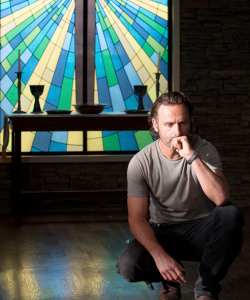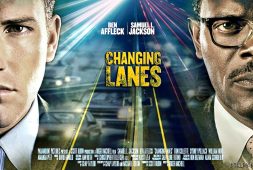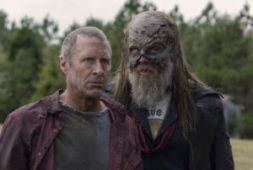
Is it ever justified to kill someone?
What if it is in self-defense? What if the people I kill are going to murder me or my loved ones? Does “Thou shalt not kill” include war? (Should U.S. Marines use Nerf Blasters?)
Is killing ever not morally or legally wrong?
These are not just questions explored in an ethics class or in Sunday school. These are questions that virtually every civilization and religion have dealt with for millennia. And there is an entire range of answers, perspectives, and further questions. These questions arise in tonight’s episode of The Walking Dead and meet with various responses and reactions.
When I was in seminary, I took an Old Testament class taught by Dr. David Howard, a notable scholar known for translating the second half of Psalms for the New Living Translation, among other things. The class was called Genesis to Ruth, and most of us were really excited about the subject matter. We all wanted to hear about what he was going to say regarding all of the violence and “holy wars” in these parts of the Bible. Many of us were pastors and looked forward to new insight in answering some of the more difficult questions we have faced from congregation members. I have so often heard questions like, “How can the same God that wants us to ‘turn the other cheek” in the New Testament, order genocide in the Old Testament?”
There are no easy answers to these questions. Many pastors answer with vague statements about culture, the progress of revelation in the scriptures and the sovereignty of God. We often point out that the cultures involved had evil practices such as child sacrifice and tribal cultic rituals that involved extreme violence. Some pastors speak of “dispensations,” while others may change the subject altogether. Any way you look at it, very few pastors will tell you it is an easy question to answer. Dr. Howard knew this was the case, and so he carved out an entire four hours just to deal with this subject extensively.
He began the lecture by saying, “You may have received questions about why God orders the Israelites to kill Canaanites in the Torah. We are going to talk about this for the next four hours.” The class was silent. Students even closed Facebook on their laptops, and we all listened intently. Then, Dr. Howard surprised us all and said, “The first thing that you have to understand is that the Canaanites were really bad!”
There was an awkward moment of silence, and then, our class erupted in laughter. I was reminded of the character that Arnold Schwarzenegger played in True Lies when his wife discovers that he is a super spy. She asks him if he has killed anyone, and he says, “Yeah, but they were all bad!” While this is funny in a James Cameron film, is it really the best answer to questions of genocide in the Old Testament?
Dr. Howard knew that it was not the whole answer, but this was the best place for him to start. After a very good lecture, I came away with this – the question remains difficult, and I will probably spend the rest of my life pondering the answers. Even Dr. Howard would admit that there were no easy answers here.
Murder is something that is discussed and described throughout the Bible. It is forbidden in the Ten Commandments. It is committed by many Bible characters including one of the sons of Adam and Eve, some of the patriarchs, some of the prophets and many of God’s anointed kings. It is prohibited more times than almost anything else, and it is a subject that Jesus would even define as an issue of the heart when he compares murder to anger. The problem is that most people (including Christians) don’t agree on how to define murder, but many have strong opinions. Does self defense resulting in a death equal murder? Is capital punishment for a serious crime murder? Is abortion murder? Is killing in the line of duty in law enforcement or the military murder? I know I have strong opinions on all of these.
Historically, Christians have been all over the map on this issue. In the first several centuries of Christianity, most Christians were pacifists. But as time went on, this changed drastically. Pacifist movements popped up here and there, but there were also many times that people killed in the name of Jesus. Even some of the greatest theological debates of the last two millennia ended in the execution of individuals for “heresy”. Some people believe that more people have been killed in the name of Jesus than any other name (I don’t know how happy Jesus is about that). The numbers are debatable, but there is no question that there is a lot of blood in the history of Christianity.
Obviously, the issue as to when killing is morally right, has been (and probably always will be) debated among Christians. But, the debate is rarely about the emotional consequences of killing or the burden that killing another human being puts on one’s soul. Rarely does the debate deal with how one lives with themself after taking another’s life – the precious gift that God has granted to us all – human life.
On tonight’s episode of The Walking Dead
, this was the primary issue that was explored. Up to this point on the show, many characters had not killed any real people – just walkers. But tonight, this changed as our gang discussed whether they should launch a “preemptive strike” against Negan’s gang, the Saviors. Everyone seemed to agree that it was probably the smart thing to do. But the question that many people asked was whether it was the right thing to do.
When Rick proposes this plan to the whole group, Morgan speaks out against it because it doesn’t include any diplomacy. He objects because the plan doesn’t give the Saviors a chance to choose their path. Rick does not like this idea.
Rick: (If) we try and talk to the Saviors, we give up our advantage, our safety. No. We have to come for them before they come for us. We can’t leave them alive!
Morgan: Where there’s life, there’s possibility.
Rick: What? Of them hitting us?
Morgan: We are not trapped in this. None of you are trapped in this.
Rick: Morgan, they always come back.
Morgan: Come back when they are dead too.
Rick: Yeah. We will stop them. We have before.
Morgan: I’m not talking about the walkers.
Morgan reminds the group that killing people always carries with it severe consequences – the dead people don’t just die – their memories continue to haunt those who have taken the life. Most people in the room know this is true.
Carol demonstrates this when she pulls out her notebook and adds some numbers to her kill list. If you look carefully, you see that she has initials of the various humans she has killed (Ryan, Karen and David, Lizzy etc.). After she adds 7 wolves to the numbers, she tallies them and circles the number 18. Even the ruthless Carol still keeps track of the 18 people that she has killed. It leaves the question, do the memories of the people that she has killed still haunt her?
Later in the episode, after the group has decided to proceed with the kill mission, Heath and Glenn are alone together in the woods. They talk about the prospect of what they are going to have to do.
Heath: We are going to kill those people tonight. Look, I’ve been lucky. I haven’t had to do it before.
Glenn: I’ve been lucky too.
Heath: You nervous?
Glenn: Have you ever seen something that um… afterwards you, you didn’t want to sleep. You weren’t hungry because when you close your eyes, you could see it? And when you try to eat…
Heath: yeah.
Glenn: Me too. Killing somebody has gotta be worse than that. Has to be. So yeah, I’m nervous. For the whole thing man. For the whole thing.
When they finally do the mission, Glenn has to kill one of the Saviors while he is asleep. Glenn lets out a sob and starts shivering after he does it. Then he helps Heath by killing the Savior that Heath is supposed to kill. It is an act of mercy where Glenn allows Heath to remain “lucky” for a short while… shorter than planned, because Heath has to kill some Saviors in a gunfight moments later.
Overall, the group has even more blood on their hands at the end of the brief battle. Glenn, Heath and Tara all kill their first human beings. It definitely takes its toll on them, even though the Saviors are ruthless killers who probably wouldn’t have hesitated to kill any of them. By the time we get to the cliffhanger of an ending, we realize that there is plenty more blood to come.
I have no idea what it feels like to kill someone. Chances are, I will probably never have to know what that feels like. But I have met a few people who have. I have talked to law enforcement officers who have had to use deadly force in the line of duty, and in every case, it has not been easy – even if the shootings were clear cases of self defense. Police departments have learned over the years that any officer related shooting requires a whole lot of counseling and paid time off. I also have family members who have killed people while defending our country. One family member who fought in World War II and Vietnam admitted to me just a couple of weeks ago (he is 93) that the memories of killing someone never actually go away. They stay with you for the rest of your life.
I have also met quite a few Christians who have struggled with these types of memories. I don’t always know what to say (and I always refer them to Christian counselors who have experienced this or have lots of experience dealing with it), but I can always point them to the scriptures.
One of the most significant people in the New Testament is Apostle Paul, author of nearly half of the New Testament books. He also started out his story as a killer of Christians. In the book of Acts, we see him standing in judgment of the Christian leader Stephen as he is stoned to death for sharing Christ. We see that Paul took his job of killing Christians seriously until God revealed Himself to Paul on the road to Damascus. Paul would be transformed from a murderer to one of the most important leaders in the church in just under two decades.
Years later, Paul occasionally talks about the fact that he used to be a murderer. He refers to himself as the “chief of sinners” and clearly speaks from the perspective of someone whose life has been radically changed by Jesus. In his letter to a church in Philippi he says:
I want to know Christ—yes, to know the power of His resurrection and participate in His sufferings, becoming like Him in His death, and so, somehow, attaining to the resurrection from the dead.
Not that I have already obtained all this, or have already arrived at my goal, but I press on to take hold of that for which Christ Jesus took hold of me. Brothers and sisters, I do not consider myself yet to have taken hold of it. But one thing I do: Forgetting what is behind and straining toward what is ahead, I press on toward the goal to win the prize for which God has called me heavenward in Christ Jesus. (Philippians 3:10-14, NIV, emphasis mine)
This was probably written decades after Paul killed anyone. But he still is clearly thinking about how to deal with his past. He admits that he has not fully recovered from his past and that Jesus is still working on him. But what Paul is saying here is that there is still freedom in Christ to help him forget the past and look toward the future. He says that it is Christ’s resurrection from the dead that makes it possible for him to press on to take hold of that for which Christ Jesus took hold of him. God is more interested in Paul’s future than he is in his past.
These are comforting words for all of us. While most of us aren’t dealing with the burden of guilt surrounding the taking of human life, we can take comfort in this – the work of Jesus sets us free from anything that we have done, or has been done to us, in the past, present and future. And I don’t know anyone who doesn’t want a clean slate!
SEASON 6, EPISODE 12 DISCUSSION QUESTIONS:
1) Carol has a list in her diary of 18 people that she has killed. Why do you think she keeps this list?
2) Why do you think Carol hasn’t really opened up and shared her feelings about killing people with anyone else?
3) Do you think that Carol’s role as “mother” and homemaker is just a facade? Do you think that her role has anything to do with her past?
4) Abraham breaks up with Rosita in a very matter of fact way. He tells her that he thought she was the last woman on earth. Was this the best way to end the relationship?
5) Do you think that Abraham and Rosita should have even been in a relationship?
6) Glenn kills a Savior so Heath doesn’t have to do it. Why do you think Glenn does this?
7) Who do you think is practically right, Morgan or Rick? Who is morally right? Should they give the Saviors a choice?
8) Do you think Rick carries the burden of guilt about the people he has killed?
9) Do you carry around guilt about things you have done in the past?
10) Do you think there is anything that you have done in the past that Jesus won’t forgive?
11) In what ways can we “press on toward the prize” as Paul talks about in his letter to the Philippians?
Thom McKee Jr. is a husband, father, pastor… and film geek (and brother of Jonathan McKee). Thom lives in Northern California with his wife and two kids.
Jonathan McKee
Jonathan McKee is the author of over twenty books including the brand new The Guy's Guide to FOUR BATTLES Every Young Man Must Face; The Teen’s Guide to Social Media & Mobile Devices; If I Had a Parenting Do Over; and the Amazon Best Seller - The Guy's Guide to God, Girls and the Phone in Your Pocket. He speaks to parents and leaders worldwide, all while providing free resources for youth workers on TheSource4YM.com. Jonathan, his wife Lori, and their three kids live in California.




david
March 12, 2016 at 7:29 pmWell, both legally and morally (notice which I placed first), it is justifiable to kill – legally depends on the geographical interpretations set in place, but generally, yes. Morally, is also dependant on the same turf, except legally and morally diverge in more secular societies. “Murder” is a different realm, and, by definition, not legal anywhere.